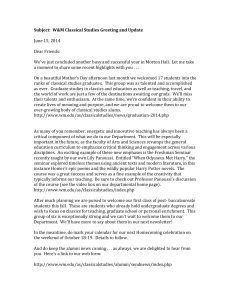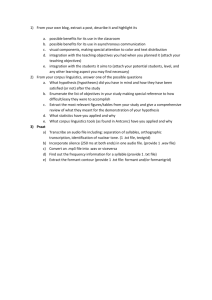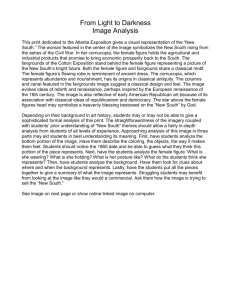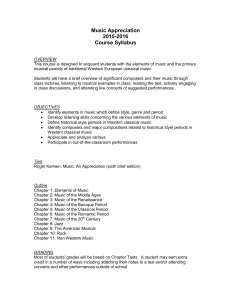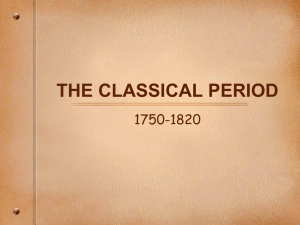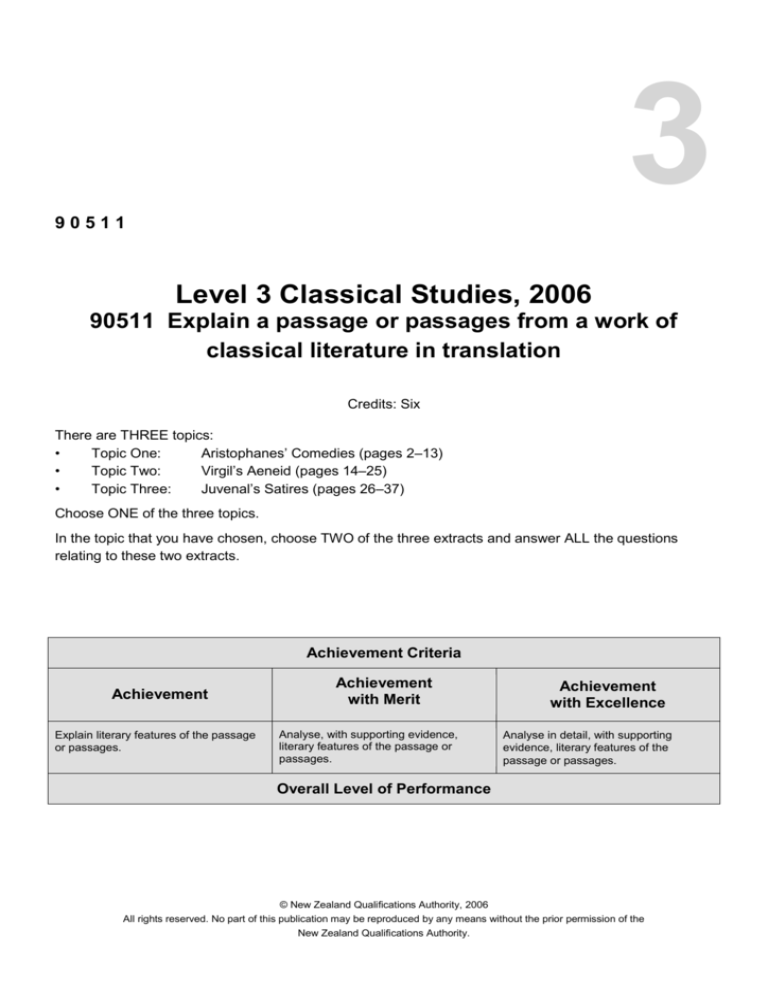
3
90511
Level 3 Classical Studies, 2006
90511 Explain a passage or passages from a work of
classical literature in translation
Credits: Six
There are THREE topics:
•
Topic One:
Aristophanes’ Comedies (pages 2–13)
•
Topic Two:
Virgil’s Aeneid (pages 14–25)
•
Topic Three:
Juvenal’s Satires (pages 26–37)
Choose ONE of the three topics.
In the topic that you have chosen, choose TWO of the three extracts and answer ALL the questions
relating to these two extracts.
Achievement Criteria
Achievement
Explain literary features of the passage
or passages.
Achievement
with Merit
Analyse, with supporting evidence,
literary features of the passage or
passages.
Achievement
with Excellence
Analyse in detail, with supporting
evidence, literary features of the
passage or passages.
Overall Level of Performance
© New Zealand Qualifications Authority, 2006
All rights reserved. No part of this publication may be reproduced by any means without the prior permission of the
New Zealand Qualifications Authority.
You are advised to spend 50 minutes answering the questions in this booklet.
EITHER:
TOPIC ONE: ARISTOPHANES’ COMEDIES
Choose TWO of the following extracts and answer ALL of the questions relating to these two extracts.
EXTRACT A
LEADER: Who is it that’s keeping you shut up in there?
[PROCLEON, putting his finger to his lips, remains silent.]
Come on, you can tell us, we’re your friends.
PROCLEON: My son. But don’t shout so loud – he’s asleep out in front there. Keep your
voices down.
LEADER: But why is he doing it? What’s his motive?
PROCLEON: He won’t allow me to go to court: [petulantly] he won’t let me do any harm to
anybody. He wants to give me a good time, he says. I’ve never heard such nonsense.
I don’t want to be given a good time.
LEADER: Outrageous! It’s a threat to democracy! He’d never dare to say such things unless
he was plotting to overthrow the constitution. Traitor! Conspirator! – But you must
try to find some way of escape. Can’t you get down to us without him seeing you?
PROCLEON: What way out is there? See if you can find one – I’ll do anything, I’m desperate.
If only I could get to court again! [Lyrically] I’m dying to file past the screens again,
with the pebble in my hand!
LEADER: Couldn’t you tunnel a way through the wall and come out disguised in rags, like
wily Odysseus?
PROCLEON: They’ve stopped up all the holes: there isn’t a chink a gnat could squeeze
through. You’ll have to think of something else. What do you think I’m made of?
Cream cheese?
LEADER: Remember the Naxos campaign, and the way you stole those spits and climbed
down the wall?
PROCLEON: Ah, yes, but things were different then. I was a young man, quick-footed and
light-fingered; at the height of my powers. And I wasn’t under guard: I could get
away quite safely. But this place is besieged: there’s a whole battalion of heavy
infantry right across my line of retreat. There are two of them down by the door,
watching every move I make. Anyone’d think I was the cat, trying to make off with
tomorrow’s joint. They’re the ones that have got the spits.
LEADER: Come on, you’ve got to think up some way of getting out, quickly – it’s getting
light.
Aristophanes, Wasps
L3 Classical Studies 90511, 2006 – page 2 of 38
(a)
(i)
Who are Procleon’s “friends” (line 3)?
(ii)
Why have they come to his house?
(b)
Explain the significance of the pebble that Procleon wants to hold in his hand (line 15).
(c)
Describe in detail Procleon’s earlier unsuccessful attempt to escape “like wily Odysseus” (lines 16–
17).
(d)
(i)
What idea does Procleon come up with for “getting out” of the house (line 29)?
(ii)
How successful is his escape?
L3 Classical Studies 90511, 2006 – page 3 of 38
(e)
Discuss in detail TWO aspects of Procleon’s character revealed in this extract. Provide evidence
from the extract to support your answer.
(1)
(2)
(f)
Discuss in detail TWO reasons for the Leader’s accusation that Procleon’s confinement represents
“a threat to democracy” (line 10).
(1)
(2)
L3 Classical Studies 90511, 2006 – page 4 of 38
(g)
(i)
In the agon, Procleon explains how he behaves in court. Discuss in detail the ways in which
he does “harm” (line 7). You must make THREE points and provide specific examples from
the play to support your answer.
(1)
(2)
(3)
(ii)
To what extent are politicians held responsible for the corruption of the Athenian justice
system in the Wasps? Provide evidence from the play to support your answer. Do not repeat
information used elsewhere.
L3 Classical Studies 90511, 2006 – page 5 of 38
EXTRACT B
XANTHIAS: Do you mean to say I’ve been lugging all these props around and now I’m not
even allowed to get a laugh out of them? It’s the regular thing, I tell you. Phrynichus,
Lysis, Ameipsias, all the popular writers do it. Comic porter scene. There’s one in
every comedy.
DIONYSUS: Well, there’s not going to be one in this one. Every time I go to a show and
have to sit through one of these scintillating comic routines, I come away more than a
year older.
XANTHIAS: Oh, my poor neck, and all for nothing.
DIONYSUS: Anyway, things have come to a pretty pass, I’m not sure that it isn’t sacrilege
or something, when I, Dionysus, son of Jug, have to struggle along on foot, while
this pampered creature is allowed to ride, so that he won’t tire himself out carrying
the luggage.
XANTHIAS: I like that. I am carrying the luggage, aren’t I?
DIONYSUS: Of course not, you’re riding.
XANTHIAS: Never mind, I’m carrying the luggage just the same.
DIONYSUS: I don’t get that.
XANTHIAS: No, I’ve got it. And I’m telling you, it weighs a packet.
DIONYSUS: But the donkey’s carrying all that.
XANTHIAS: Oh, is he? You ask my shoulders!
DIONYSUS: Ah, well, in that case the donkey’s not being much use to you, is he? You’d
better change places with him.
XANTHIAS: Oh, for heaven’s sake! If only I’d been in that sea battle, I’d be a free man now.
And if I got my hands on you …
DIONYSUS: Come on, get down off that moke. Here we are, if I’m not mistaken. This is
where we pay our first call. You see, I’ve walked the whole way.
[While XANTHIAS disentangles himself and his burdens from the donkey, DIONYSUS
approaches the front door and knocks cautiously. There is no response.]
Hallo there!
[There is still no response. Remembering his disguise, he swings his club, hitting the door
with a resounding crash.]
Hallo, there! Slave! Open up!
Aristophanes, Frogs
L3 Classical Studies 90511, 2006 – page 6 of 38
(a)
(b)
(i)
Who are Dionysus and Xanthias intending to visit at this point in the play?
(ii)
What is the purpose of their visit?
(i)
What part of the ancient theatre represented the house that Dionysus and Xanthias are
intending to visit?
(ii)
What did this part of the theatre represent later in the play?
(c)
“Every time I go to a show and have to sit through one of these scintillating comic routines …”
(lines 5–7).
Why does Dionysus have experience as a theatre-goer?
(d)
Explain ONE reason why Dionysus calls himself “son of Jug” (line 10).
L3 Classical Studies 90511, 2006 – page 7 of 38
(e)
What visual or non-verbal humour does Aristophanes use in this opening episode of the play? You
must make TWO detailed points and provide evidence from this extract to support your answer.
(1)
(2)
(f)
(i)
Explain in detail the reference to the “sea battle” (line 22).
(ii)
When Xanthias is about to cross into Hades later in the play, what setback does he suffer as
a result of not having been in this sea battle? Explain in detail.
L3 Classical Studies 90511, 2006 – page 8 of 38
(g)
(i)
What sort of relationship does Xanthias have with his master in this scene? Provide evidence
from this extract to support your answer.
(ii)
Discuss TWO other episodes that shed light on the relationship between Dionysus and
Xanthias. Describe each episode in detail and explain what insight it gives into the
relationship.
(1)
(2)
(iii)
In what way might this relationship reflect the social climate of Athens at the time of the
original performance of the Frogs?
L3 Classical Studies 90511, 2006 – page 9 of 38
EXTRACT C
DIONYSUS: Then we must do the thing properly. Bring the brazier and the incense! As the
judge of this most, ah, interesting cultural event I must offer up a prayer, before the
shafts of wit begin to fly.
[DIONYSUS rises, takes incense and a libation cup from an attendant and goes to the altar. All present put
wreaths on their heads. DIONYSUS burns incense and pours a libation.]
DIONYSUS [to the CHORUS]: A hymn to the Muses!
CHORUS: When men of sage and subtle mind
In fierce debate their views do vent,
And strive some deathless phrase to find
To mask each specious argument –
Then Zeus’ virgin daughters nine
Stand by to watch the sport divine.
Come then today, ye Muses bright!
Two grimmer foes ne’er took the field:
For one is armed with words of might,
And one the sword of wit doth wield.
O heavenly maids, your presence lend!
The fight is on! Descend! Descend!
DIONYSUS: Now you two must each offer a prayer, before we begin.
AESCHYLUS: O Demeter, that didst nourish my brain, may I prove worthy of thy Mysteries!
DIONYSUS: Now Euripides: take the censer, it’s your turn.
EURIPIDES: No, no thank you, I pray to other gods.
DIONYSUS: What, special ones of your own? A private Pantheon?
EURIPIDES: Precisely.
DIONYSUS: Carry on, then; pray to your lay gods.
EURIPIDES: Hail, Ether, my grazing ground! Hail, Pivot of my Tongue! Hail, Mind! Hail,
sentient Nostrils! Inspire me with all the right answers, amen!
CHORUS: We’re expecting, of course, to pick up a few tips
From these poets so clever and wise,
As the elegant vocables fall from their lips
And their tempers progressively rise.
Since neither is lacking in brains or in grit
It should be a most thrilling debate;
But while one pins his hopes on his neatly turned wit,
The other relies upon weight.
For shrewd dialectic he cares not a jot;
And though traps be contrived for his fall
He’ll swoop down like a storm and demolish the lot –
Quips, quibbles, opponent, and all.
Aristophanes, Frogs
L3 Classical Studies 90511, 2006 – page 10 of 38
(a)
(b)
(i)
Who are the members of the chorus who sing the hymn to the Muses?
(ii)
What costumes might they be wearing to indicate their identity?
(i)
In which part of the ancient theatre did the chorus probably perform their hymn to the
Muses?
(ii)
Give ONE reason why this performance area was suitable for the chorus.
(c)
Why are the Muses urged to: “Descend! Descend!” (line 18)?
(d)
What specific dispute has led to this contest between the two “foes” who are about to take the
“field” (line 14)?
L3 Classical Studies 90511, 2006 – page 11 of 38
(e)
Explain in detail what Aeschylus’ prayer reveals about his character and / or attitudes. You must
make TWO detailed points and provide evidence from this extract to support your answer.
(1)
(2)
(f)
Explain in detail what Euripides’ prayer reveals about his character and / or attitudes. You must
make TWO detailed points and provide evidence from this extract to support your
(1)
(2)
L3 Classical Studies 90511, 2006 – page 12 of 38
answer.
(g)
(i)
Discuss ONE important difference in the poetic styles of Aeschylus and Euripides that is
emphasised in this extract. Quote the lines that illustrate this difference and explain what
they mean.
(ii)
Discuss in detail TWO other major differences between the works of Aeschylus and
Euripides that are emphasised elsewhere in the agon. Provide evidence to support your
answer.
(1)
(2)
(iii)
Why is Aeschylus ultimately chosen as the playwright who will return with Dionysus?
L3 Classical Studies 90511, 2006 – page 13 of 38
You are advised to spend 50 minutes answering the questions in this booklet.
OR:
TOPIC TWO: VIRGIL’S AENEID
Choose TWO of the following extracts and answer ALL of the questions relating to these two extracts.
EXTRACT A
In answer to her questions, Aeneas spoke with a deep sigh
out of his very heart; ‘Lady Divine, if I were to start at the
beginning and then continue all the chronicle of our ordeals,
and if there were the time for you to hear, the star of evening
would surely close heaven’s gate, and set the day to sleep,
before the end. From ancient Troy, if that name has ever
chanced to come to your ears, we had been sailing over many
strange seas; and then of its own caprice a storm drove us on
Africa’s coast. I am Aeneas, called the True, and I carry with
me in my ships the gods of our home rescued from the foe.
Beyond the sky my fame is known; and I quest for Italy, the
land where my family first sprang from supreme Jove. Following
my allotted destiny, and shown my way by my divine
mother, I sailed forth onto the Phrygian Sea with twenty
ships. Scarce seven survive, wrested from the easterly wind
and from the waves. And here I wander, in want, unknown,
about Africa’s wilderness, driven first from Asia and now from
Europe too.’
Virgil, Aeneid, Book I
L3 Classical Studies 90511, 2006 – page 14 of 38
(a)
(b)
(i)
To whom is Aeneas speaking in this extract?
(ii)
In what disguise does she appear to Aeneas?
What information has Aeneas just received about the ruler of Carthage? You must name the ruler
and provide at least TWO additional details.
Name:
Details:
(1)
(2)
(c)
(i)
Who were “the foe” (line 10) who had fought against the Trojans?
(ii)
Name TWO of the kings or leaders of these people.
(1)
(2)
(d)
(i)
By what name is “supreme Jove” more commonly known (line 12)?
(ii)
How is Aeneas related to this god?
L3 Classical Studies 90511, 2006 – page 15 of 38
(e)
(f)
(i)
Explain in detail what really caused the storm, which Aeneas says arose “of its own caprice”
(line 8).
(ii)
Who calmed the storm and for what reason? Explain in detail.
(i)
Give details of TWO reassurances that are given to Aeneas in the passage immediately
following this extract.
(1)
(2)
(ii)
Explain in detail the omen that is used to illustrate and confirm these reassurances.
L3 Classical Studies 90511, 2006 – page 16 of 38
(g)
Discuss the indications of Aeneas’ destiny that are found in this extract, with particular reference to
the following points:
(i)
“Aeneas, called the True” (line 9)
(ii)
“the gods of our home” (line 10)
(iii)
“Following my allotted destiny” (lines 12–13)
(iv)
“shown my way by my divine mother” (lines 13–14)
L3 Classical Studies 90511, 2006 – page 17 of 38
EXTRACT B
‘But now appeared Panthus, Othrys’ son, who was priest
of Apollo’s temple on the citadel. He had escaped the Greek
missiles and was running wildly to our doorway, leading his
little grandson by the hand and carrying his sacred vessels and
figures of his defeated gods. “Panthus,” I cried, “Which is
the point of greatest danger? Where do we take our stand?”
I had hardly spoken when with a moan he replied, “The last
day has come for our Dardan land. This is the hour which no
effort of ours can alter. We Trojans are no more: no more is
Ilium; no more the splendour of Teucrian glory. All now
belongs to Argos; it is Jupiter’s remorseless will. For the
Greeks are masters of our city and already it burns. The Horse
stands towering within our ramparts, streaming armed men;
and Sinon glorying in his triumph stirs the blaze. The main
array of the Greeks, all those thousands who came from
imperial Mycenae, mass at the open gates. Others have blocked
the narrow streets with weapons levelled, and their unsheathed
swordpoints, a flickering line of steel, stand instantly
ready to kill. Only the foremost sentinels at the gates attempt
resistance, and they fight blind.”
‘These words from Panthus, together with some impulse
from above, sent me dashing into the fires and the fight,
guided by the roaring, the shouts which rose to heaven, and
the dark instinct of revenge.’
Virgil, Aeneid, Book II
L3 Classical Studies 90511, 2006 – page 18 of 38
(a)
(i)
Who had just appeared to Aeneas in a dream?
(ii)
What instruction did this person give Aeneas?
(b)
Describe in detail what Aeneas is preparing to do when Panthus appears at the doorway.
(c)
(i)
Prior to the events described in this extract, where did the Trojans think the Greeks had
gone?
(ii)
Where had the Greeks gone in reality?
(d)
Describe TWO warning signs that should have alarmed the Trojans as they were bringing the
Horse inside their city walls.
(1)
(2)
L3 Classical Studies 90511, 2006 – page 19 of 38
(e)
(f)
(i)
Which Trojan had spoken out strongly against bringing the Horse inside the city?
(ii)
Explain why he had given this warning.
(iii)
Describe in detail what had happened to this Trojan.
Discuss the portrayal of Aeneas in this extract. You must make TWO detailed points and provide
evidence from the extract to support your answer.
(1)
(2)
L3 Classical Studies 90511, 2006 – page 20 of 38
(g)
(i)
Explain in detail ONE impression given of the Greeks in this extract. Provide evidence from
the extract to support your answer.
(ii)
Discuss THREE impressions given of the Greeks elsewhere in Book II. You must refer to
THREE different events and provide evidence from Book II to support your answer.
(1)
(2)
(3)
L3 Classical Studies 90511, 2006 – page 21 of 38
EXTRACT C
About
this river, like bees in a meadow on a fine summer day settling
on flowers of every kind, when lilies gleaming white are
sprinkled everywhere and all the fields are noisy with the hum,
the souls of countless tribes and nations were flitting.
Aeneas was startled by the sudden sight, and in his bewilderment
wished to hear his doubts explained, and find what might this
river be which he saw before him, and who they were who
crowded its banks with this numerous array. His father
Anchises gave answer: ‘They are souls who are destined to
live in the body a second time, and at Lethe’s wave they
are drinking the waters which abolish care and give enduring
release from memory. I have long desired to tell you
of them and point them out to you in person for you to see; I
wished to detail them to you, these descendants of my line,
that you might rejoice with me the more in having found
Italy.’ ‘Oh, Father, am I therefore to believe that of these souls
some go, soaring hence, up to the world beneath our sky and
return once more into dreary matter? Why should the poor
souls so perversely desire the light of our day?’ ‘I shall tell you,
indeed, and I shall not leave you in suspense, my son.’
Anchises took up his tale and revealed each truth in due order.
Virgil, Aeneid, Book VI
L3 Classical Studies 90511, 2006 – page 22 of 38
(a)
(i)
Name the person who guides Aeneas on his journey through the underworld.
(ii)
Give TWO details about this person.
(1)
(2)
(b)
(c)
(d)
(i)
What has made Aeneas come to the underworld?
(ii)
Name one person from his past that Aeneas has already met in the underworld.
(i)
In which part of the underworld is this meeting taking place?
(ii)
What did Aeneas leave at the threshold of this place?
Explain TWO points of similarity between the simile in lines 1–4 and the scene that it illustrates.
(1)
(2)
L3 Classical Studies 90511, 2006 – page 23 of 38
(e)
(f)
(i)
“Why should the poor souls so perversely desire the light of our day?” (lines 19–20) Explain
in detail what these words reveal about the character of Aeneas.
(ii)
Describe in detail a similar incident in Book VI where Aeneas displays the same
characteristic.
(i)
According to Anchises, in the passage immediately following this extract, what makes the
soul lose its purity during life? Give a detailed answer.
(ii)
Explain in detail the processes by which, according to Anchises, the soul is purified
immediately after death.
L3 Classical Studies 90511, 2006 – page 24 of 38
(g)
(i)
Explain the general purpose Anchises had in showing Aeneas the “descendants of my line”
(line 15).
(ii)
Discuss the specific purpose Anchises had in showing Aeneas any THREE of the following
individuals or groups:
•
Romulus
•
two of the Roman kings
•
Augustus
•
Pompey and Caesar
•
Marcellus (the younger)
(1)
(2)
(3)
L3 Classical Studies 90511, 2006 – page 25 of 38
You are advised to spend 50 minutes answering the questions in this booklet.
OR:
TOPIC THREE: JUVENAL’S SATIRES
Choose TWO of the following extracts and answer ALL of the questions relating to these two extracts.
EXTRACT A
Since the days of the Flood, when Deucalion first ascended
that mountain-top in his vessel, and looked for a sign,
and slowly the hard stones warmed into living softness,
and Pyrrha confronted those early males with their naked mates,
when has there been so abundant a crop of vices? When
has the purse of greed yawned wider? When was gambling
more frantic? Today men face the table’s hazards
with not their purse but their strong-box open beside them.
Here you’ll see notable battles, with the croupier for squire,
stakes for arms. Isn’t it crazy to lose ten thousand
on a turn of the dice, yet grudge a shirt to your shivering slave?
In the old days who’d have built all those country houses, or dined
off seven courses, alone? Now citizens must scramble
for a little basket of scraps on their patron’s doorstep.
He peers into each face first, scared stiff that some imposter
may give a false name and cheat him: you must be identified
before you get your ration. The crier has his orders:
even the Upper-Ten must answer his summons, they’re scrounging
along with the rest.
Juvenal, Satire I
L3 Classical Studies 90511, 2006 – page 26 of 38
(a)
(b)
(c)
(d)
(i)
Who were Deucalion and Pyrrha (lines 1 and 4)?
(ii)
Why does Juvenal mention them here?
(i)
What did Deucalion and Pyrrha have to do before “the hard stones warmed into living
softness” (line 3)?
(ii)
What does “the hard stones warmed into living softness” mean?
(i)
What does “table’s hazards” refer to in line 7?
(ii)
Give another expression from this extract that refers to the same thing.
Name TWO political offices that gave membership to the “Upper-Ten” (line 18).
(1)
(2)
L3 Classical Studies 90511, 2006 – page 27 of 38
(e)
(f)
(i)
Explain the point about the patron–client relationship that Juvenal is making in
lines 13–14: “Now citizens must scramble for a little basket of scraps on their patron’s
doorstep”.
(ii)
Identify and explain another reference to the patron–client relationship in this extract.
In this extract, Juvenal refers to TWO other important issues that concern him in addition to the
patron–client relationship. Identify and explain these issues, supporting your answer with evidence
from the extract.
Issue 1:
Issue 2:
L3 Classical Studies 90511, 2006 – page 28 of 38
(g)
(i)
By including such issues in his first satire, Juvenal is making a point about the writing of
satire. Explain this point.
(ii)
Identify and give an example of THREE literary techniques used by Juvenal in this extract to
persuade his audience. Explain the intended effect of each of these techniques.
(1) Technique:
Example from extract:
Intended effect:
(2) Technique:
Example from extract:
Intended effect:
(3) Technique:
Example from extract:
Intended effect:
L3 Classical Studies 90511, 2006 – page 29 of 38
EXTRACT B
For the lower-income guests, some dubious toadstools:
for my lord, a rare mushroom, the kind that Claudius guzzled
(until his wife fed him one that wrote finis to his eating).
For himself, and his fellow-tycoons, friend Virro will order
the choicest fruits to be served, their scent a feast in itself,
fruit such as grew in Phaeacia’s eternal autumn,
or might, you feel, have been rifled from the Hesperides.
For yourself, a rotten apple, the sort munched on the Embankment
by monkeys with shield and helmet, cringing beneath the whip
as they learn to throw spears from the back of some shaggy she-goat.
Perhaps you think Virro’s close-fisted? No way. He does it
to make you suffer. What farce, what pantomime could elicit
bigger laughs than your pleading gullet? His whole idea –
in case you didn’t get it – is simply to reduce you
to furious tears, an endless grinding of molars.
You see yourself as a free man, your lord’s invited guest;
but he assumes you’ve been hooked by the smell from his kitchen –
and he’s not far wrong. For what self-respecting person,
however down-and-out, whether born to the purple
or a simple peasant, would put up with Virro twice?
It’s the hope of a good dinner that lures you – “Surely he’ll give us
a picked-over hare, or some scraps from the boar’s butt-end?
Surely a chicken’s carcase will come our way?”
Juvenal, Satire V
L3 Classical Studies 90511, 2006 – page 30 of 38
(a)
(i)
Who was Claudius (line 2)?
(ii)
Why did a mushroom “write finis” to his eating, according to Juvenal (line 3)?
(b)
Explain the reference to “Phaeacia’s eternal autumn” (line 6).
(c)
Describe TWO things that happened on the “Embankment” in Rome (line 8).
(1)
(2)
(d)
Explain the reference to “born to the purple” (line 19).
(e)
Why does Juvenal choose the dinner party as the setting for this satire? You must give TWO
detailed reasons and support your answer with evidence from Satire V.
(1)
(2)
L3 Classical Studies 90511, 2006 – page 31 of 38
(f)
(i)
Describe in detail THREE specific obligations patrons had toward their clients in Roman
society.
(1)
(2)
(3)
(g)
(ii)
Identify and explain ONE example from this extract of the patron’s failure to meet these
obligations.
(i)
Discuss, with supporting evidence, TWO ways in which Juvenal characterises Trebius, the
client, in this extract.
(1)
(2)
L3 Classical Studies 90511, 2006 – page 32 of 38
(ii)
Identify and discuss TWO examples from elsewhere in Satire V that support this
characterisation or further develop the characterisation of Trebius.
(1)
(2)
L3 Classical Studies 90511, 2006 – page 33 of 38
EXTRACT C
When a doting mother passes the shrine of Venus,
she’ll whisper one prayer for her sons, and another – rather louder,
more detailed – for her daughters to have good looks. “What’s wrong?”
she’ll ask you, “Didn’t Latona rejoice in Diana’s beauty?”
Perhaps; but Lucretia’s fate should warn us not to pray
for a face like hers; Virginia would happily yield her features
to Rutila, take on poor Rutila’s hump. A physically
handsome son keeps his wretched parents in constant
anxiety: coexistence of good looks and decency
is rare indeed. However old-fashioned is background,
however strict the morality on which he was brought up –
and even if Nature, with generous, kindly hand has
turned him out a pure-minded, modestly blushing
youth (and what greater gift, being more powerful
than any solicitous guardian, could she bestow?) –
manliness still is denied him. A seducer will not scruple
to lay out lavish bribes, corrupt the boy’s very parents:
cash always wins in the end. But no misshapen
stripling was ever unsexed by a tyrant in his castle,
no Nero would ever rape a clubfooted adolescent –
much less one with a hump, pot-belly, or scrofula.
Juvenal, Satire X
L3 Classical Studies 90511, 2006 – page 34 of 38
(a)
Explain why Venus is an appropriate goddess for the “prayer” (line 2).
(b)
(i)
What happened to Virginia (line 6)?
(ii)
Why does Juvenal think this happened to her?
(i)
What technique is Juvenal using in lines 14–15: “… (and what greater gift, being more
powerful than any solicitous guardian, could she bestow?)”?
(ii)
How does this technique help to make his point more effective?
(c)
(d)
What point is Juvenal making in the last sentence of this extract (lines 18–21)?
L3 Classical Studies 90511, 2006 – page 35 of 38
(e)
In the section immediately following this extract, Juvenal gives examples of what will happen to a
handsome son. Explain in detail what happens in TWO of these examples.
(1)
(2)
(f)
Later in this same section of Satire X, Juvenal describes the fate of a handsome young man who is
“raped and doomed by one glance from Messalina’s eyes”.
(i)
Describe in detail the plans Messalina has for this young man.
(ii)
Explain why the young man is likely to die whether he agrees to carry out her wishes
or not.
L3 Classical Studies 90511, 2006 – page 36 of 38
(g)
(i)
This extract deals with only one of the common wishes of men that Juvenal sees as foolish
or futile. Discuss THREE other wishes from elsewhere in Satire X that he regards in the
same way. For EACH foolish or futile wish, you must explain Juvenal’s viewpoint and make
detailed reference to one person he uses as an example to illustrate his viewpoint.
(1)
(2)
(3)
(ii)
Explain in detail what Juvenal thinks men should pray for.
L3 Classical Studies 90511, 2006 – page 37 of 38
Acknowledgements
Topic One
Extract A:
Aristophanes, The Frogs and Other Plays, trans. David Barrett (London: Penguin
Books, 1964), pp 50–51.
Extract B:
Ibid., pp 156–157.
Extract C:
Ibid., pp 188–190.
Topic Two
Extract A:
Virgil, The Aeneid, trans. W. F. Jackson Knight (London: Penguin Books, 1958),
pp 38–39.
Extract B:
Ibid., pp 60–61.
Extract C:
Ibid., pp 168–169.
Topic Three
Extract A:
Juvenal, The Sixteen Satires, trans. Peter Green (London: Penguin Books, 1998),
pp 5–6.
Extract B:
Ibid., p 33.
Extract C:
Ibid., p 84.
L3 Classical Studies 90511, 2006 – page 38 of 38

